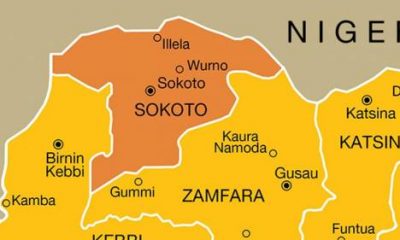Education
Tambuwal Flags Off Nigeria’s Largest School Enrollment Drive, Targets 1.4 Million

Sokoto state governor, Aminu Waziri Tambuwal, has flagged off Nigeria’s largest school enrollment drive which targets 1.4 million new intakes in the next one year at Riji village, the birthplace of former Premier of Northern Nigeria, Sir Ahmadu Bello, the Sardauna of Sokoto.

The event was also used to officially launch the state cash transfer scheme, the Nigerian partnership for education project and the prototype early childhood development centres (ECD).
Speaking at the event, Tambuwal said his administration would continue to invest significant amount of time and resources in orderto turn around the fortunes of the education sector.
“The enrollment drive is a high level advocacy mechanism, which ensures that all stakeholders partake in ensuring effective awareness and mobilisation of parents, guardians, communities, religious and traditional leaders as well as the school based management committees on the importance of enrolling all school-age children into schools,” he stated.
The governor added that the enrollment campaign would primarily concentrate on community level activities, especially house to house campaigns.
“This will be achieved through empowerment of SBMCs, mothers’
associations, religious and traditional leaders and other takeholders to conduct campaign in their communities.
“They will, in addition, regularly track and monitor attendance of enrolled children in their respective schools and communities as part of their oversight responsibilities,” he added.
In his remarks, the state Commissioner of Basic and Secondary Education, Dr. Jabbi Kilgore, said although the figure of 1.4 million new intakes into schools is ambitious, it is realisable because of government’s target of integrating 4000 Qur’anic schools with existing school models and other strategies introduced.
In his goodwill message, the UNICEF acting chief of field office for Sokoto, Zamfara and Kebbi, Mr. Paul Mudzondo, said the event was unique and historic in the sense that, apart from campaign for enrollment, government has provided stipends to poor families to support enrollment and maintenance of children, especially girls, in schools.
-

 News5 days ago
News5 days agoInsecurity: Kogi Schools Resume On Monday
-

 Opinion4 days ago
Opinion4 days agoDon’t Pull the Plug: Why Nigerians Are Pleading for the U.S. to Extend Its Police Training Program — and Why It Must Synergize With New Military Arrivals
-

 Crime4 days ago
Crime4 days agoVigilante Reportedly Shoots Colleague Dead In Plateau
-

 Crime4 days ago
Crime4 days agoMan Shot Dead In Ambush Along Jol-Sho Road In Plateau










